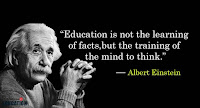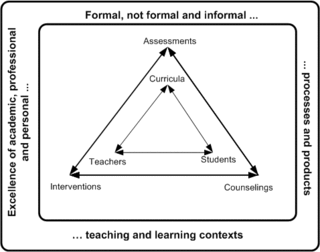'For many a gem of purest ray serene
The dark unfathomed caves of ocean bear;
Full many a flower is born to blush unseen,
And waste its sweetness on the desert air.'
-THOMAS GRAY
The duty of a teacher is to bring out the hidden gem-like talents in the students and to make all possible efforts to ensure that the tender plants (young children) do not waste their sweet fragrance (innocent smiles) in wilderness (unattractive and non congenial environment). Teachers need to understand the basic principles of education psychology so that optimum development of the students take place.
EDUCATION :
The word 'Education' has a wide definition, there is no single objective that can cover life in its entirety along with its various manifestations. Education is a word derived from the Latin word 'ēducātiō' which means bringing up,breeding, rearing, and ēducõ means training. Educatum means the act of teaching. Education is the process of facilitating learning or the acquisition of knowledge, belief, skills, values, morals and habits. However learners can also educate themselves, usually education takes place in the guidance of educators. Education can take place as both formal and informal. Formal education divided into four stages they are pre school, primary school, secondary school, college, university or apprenticeship.
In our country India, up to certain age the education is compulsory. Like that, in many other countries and United Nations the right to education has been recognised. Global initiatives aim to promote the quality education for all. For Aristotle education is a "creation of a sound mind in a sound body". Swami Vivekananda says education is the "manifestation of the perfection already in man".
In our country India, up to certain age the education is compulsory. Like that, in many other countries and United Nations the right to education has been recognised. Global initiatives aim to promote the quality education for all. For Aristotle education is a "creation of a sound mind in a sound body". Swami Vivekananda says education is the "manifestation of the perfection already in man".
EDUCATIONAL PSYCHOLOGY :
Educational psychology consist of two words psychology and education. The meaning and definitions of the psychology was given in the previous post. To get the detailed view on psychology check out our previous post.
Educational psychology includes various definitions from different psychologist.
Anderson says "Educational psychology is a subject to be studied, an area of field of knowledge, a set of application of laws and principles from a wide field of knowledge to a social process, a set of Tools and techniques and a field of research". While General Psychology is a pure science, education psychology is its application in the field of education with the aim of socializing man and modifying his behaviour.
BF Skinner gives two definitions on educational psychology. The first is "Educational psychology covers the entire range of behaviour and personality as related to education" and the another is "Educational psychology is the branch of psychology that deals with teaching and learning". In general, it defines describe and explain the changes that takes place in the learner through his various stages of development. It is the study of human mind as it appears upon learning and teaching activities. Learning and teaching are the focal points of educational psychology. It investigates the methods and techniques of imparting education to the learner discovers a number of general rules and apply this to the practical problems of learning.
BF Skinner gives two definitions on educational psychology. The first is "Educational psychology covers the entire range of behaviour and personality as related to education" and the another is "Educational psychology is the branch of psychology that deals with teaching and learning". In general, it defines describe and explain the changes that takes place in the learner through his various stages of development. It is the study of human mind as it appears upon learning and teaching activities. Learning and teaching are the focal points of educational psychology. It investigates the methods and techniques of imparting education to the learner discovers a number of general rules and apply this to the practical problems of learning.
HISTORY OF ITS DEVELOPMENTS:
In the Prehistoric period, the adult train the young people with the knowledge and skills needed to live in their society. In preliterate society, the educational learning done orally and through imitations. The knowledge, values, skills and the history of the Ancients were passed through stories.
As the culture developed, the formal education also began to develop. The progress of educational psychology can be traced back from the time of Plato and Aristotle. Plato founded an Academy in Athens and it was considered to be the first institute for higher education in Europe. Plato believed that the knowledge of human nature was one of the Essentials for a well equipped teacher. It was the function of education to provide nurturing to the main elements of human nature.However, the word psychology was first used in 1576, the works of many great educationist who helped the growth of educational psychology in its various form are mentioned. Francis galton (1822-1911), the author of hereditary genius (1869) had done numerous Investigation on individual differences and stated his ideas on the importance of genius. His ideas were followed in the experiments of Wilhelm Wundt and William James who conducted significant studies on memory the transfer of training and emotional responses. Stanley hall in his journal of psychology(1887) , stated some useful principles governing stages of human growth. John Dewey (1856-1952) said that 'Education must begin with psychological insight into the childs capacities, interests and habits... These powers, interests and habits must be continually interpreted; we must know what they mean. They must be translated into terms of their social equivalents– into terms of what they are capable of in the way of social service'. The Other great psychologists like WB Cannon, John B Watson, Max wertheimer, WolfgangKohler made significant contribution to the educational psychology. Sigmund freud (1856-1939) founded a school of psychoanalysis. Alfred binet (1857- 1911) founded intelligence Tests in 1908. Alfred Adler (1870-1937) found a school of individual psychology. Carl gustav jung (1875-1961) is known for analytical psychology. Jean piaget (1896-1980) is famous for his theory of cognitive development.
NATURE OF EDUCATIONAL PSYCHOLOGY:
It combines
the two fields i.e. Education and Psychology. Educational Psychology is an applied form of
psychology. The application of the principles of Psychology to education is
Educational Psychology. It is the basic science of Psychology used to help to
solve the practical problems of education. Educational Psychology is a practical science,
the utility of that is measured by the changes brought about in
behaviour through education. After adopting the principles of psychology, it became a positive science. Educational Psychology is helpful in the achievement
of the practical ideals of life. Educational Psychology is a field of knowledge
with which students, teachers and parents must be familiar. Educational
Psychology is a systematic study. It draws heavily from various branches of
psychology, biology, sociology and anthropology. Educational Psychology collects facts and data
using the scientific methods especially through observation of phenomenon under
natural and under controlled conditions. Educational psychology is an applied branch of
the subject psychology. Psychology deals
with all the behaviour of all individuals. But educational psychology deals
only the behaviour of the students. It
gives the technical guidance to the student in a satisfactory way. Educational psychology is not a perfect
science. It employs scientific method
and adopts scientific approach to study the behaviour of an individual in
educational situation. Educational
psychology mainly focuses
on,
- The learner
- The teacher
- The learning process
- The learning experiences and learning Situation
- The Teaching situation
- Evaluation of learning performance
SCOPE OF EDUCATIONAL PSYCHOLOGY:
Educational psychology must take to enrich knowledge and develop competency in,
- Growth and development of individual
- The learning process
- Motivation
- Personality
- Individual differences of heredity and environment
- Intelligence
- Measurement and evaluation
- Elementary statistics in education
- Special education
- Elementary research techniques
Educational psychology help the teacher to get actual understanding about the aims of education. That is, it help them to understand the inner potentialities that underlie the behaviour of the student. Knowledge about the learner was as necessary as the knowledge of the subject. For this purpose, the educator have to consider the mental process of the child, not only the quality of knowledge but also the mental capacity of the the child. Acquisition of knowledge also help in modifying the behaviour of the children. Educational psychologists can analyse the aim of education and determine its practical application with the reference to the the fundamental laws of psychology. Effective educational psychology can be applied by teachers, by following the findings and methods as a part of educational practices. For evaluating the learning performance, statistical methods and Research should be conducted on educational problems.










Very thanks
ReplyDeleteThanks da
ReplyDelete